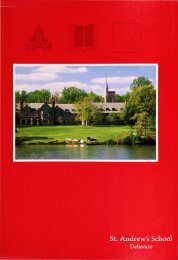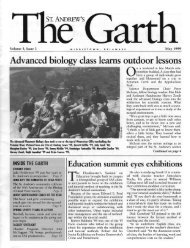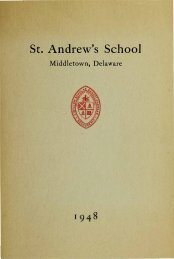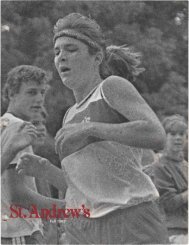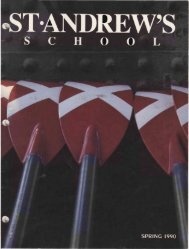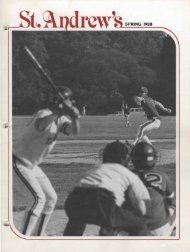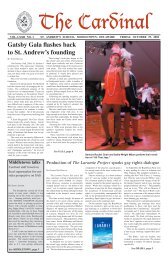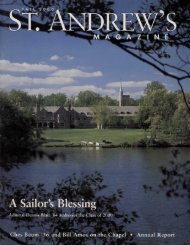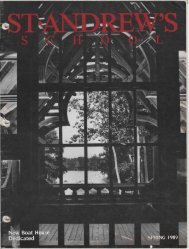Untitled - Saint Andrew's School Archive - St. Andrew's School
Untitled - Saint Andrew's School Archive - St. Andrew's School
Untitled - Saint Andrew's School Archive - St. Andrew's School
You also want an ePaper? Increase the reach of your titles
YUMPU automatically turns print PDFs into web optimized ePapers that Google loves.
SCIENCE<br />
What is science? Twentythree<br />
centuries ago,<br />
Aristotle explained,<br />
"The object of scientific<br />
knowledge is of necessity. Therefore,<br />
it is eternal; for things that are of<br />
necessity in the unqualified sense<br />
are all eternal; and things that are<br />
eternal are ungenerated and imperishable."<br />
Our purpose in the science<br />
department at <strong>St</strong>. <strong>Andrew's</strong> is to<br />
touch upon universal things that<br />
are, insofar as our imperfect knowledge<br />
tells us, eternal and, therefore,<br />
ungenerated of their own selves and<br />
imperishable. Because we do not<br />
intend our graduates to have an<br />
understanding of science only incidentally,<br />
they must learn how to<br />
acquire, evaluate and practice scientific<br />
knowledge preparatory to its<br />
eventual application. For better or<br />
worse, science has shaped our<br />
world, ourselves, and now determines<br />
our future.<br />
Essential to our concept of science<br />
education is the imparting of welltested<br />
method, a perspective of the<br />
intrinsic worth of a scientific fact,<br />
intelligent skepticism, creativity, the<br />
compelling, exploratory search for<br />
truth, the Law of Parsimony as it<br />
applies to reality, and awe that we<br />
are able to contemplate and understand<br />
what we do. Brain matter is<br />
stuff of the common elements, a<br />
temporary fragment of the universe<br />
comprehending itself, ten billion<br />
cells with a functional capacity of<br />
2.8 x 1020 bits of information. Not a<br />
bad computer at all.<br />
We recognize science as one of the<br />
great modern humanities. While<br />
we do not turn out scientists at <strong>St</strong>.<br />
<strong>Andrew's</strong>, we are dedicated to producing<br />
scientifically literate young<br />
men and women who are trained in<br />
logic and discipline as well as method,<br />
and who are capable of taking<br />
the next step at the college level.<br />
Science is meaningless unless we<br />
understand its historical quality, the<br />
broad experience and tested know!-<br />
edge from which it has grown, and<br />
its inevitable thrust forward despite<br />
arbitrary and temporary controls.<br />
Science must be examined, tried,<br />
weighed, directed, applied through<br />
emerging technology, and recognized<br />
as one more example of the<br />
creative surge generated within the<br />
human intellect. Despite modern<br />
trappings and advances, the questioning,<br />
searching nature of the scientific<br />
mind has changed little from<br />
Aristotle's day.<br />
It is our belief one can no longer<br />
survive intelligently in an increasingly<br />
complex world without a background<br />
in scientific discipline of the<br />
sort available to our students through<br />
exacting and demanding courses of<br />
study. Infused throughout are applications,<br />
challenges, recognition of<br />
benefits and hazards, inspiration in<br />
the present and hope for the future.<br />
Biology<br />
s a first laboratory science, Biology<br />
is a thorough and stimulating<br />
Aintroduction to the phenomenon<br />
of life in all its aspects and serves as a<br />
prerequisite to those who wish to elect<br />
any of the other life science major or<br />
minor courses we offer. Emphasis is<br />
placed on the basic biochemical and<br />
structural unity of all plants and animals,<br />
evolution of the diversity of life<br />
forms, human structure and function,<br />
plant structure and function and ecology.<br />
Extensive field and laboratory work,<br />
independent study and library research<br />
add to the course spectrum. Text: Kormondy<br />
& Essenfeld, Biology, A Systems<br />
Approach; Mowat, Nroer Cry Wolf; Hubbell,<br />
A Country Year. (111 or IV Fonn)<br />
Advanced Biology<br />
he aim of this second-year biology<br />
course is to look in depth at a broad<br />
T<br />
range of topics in biology with the<br />
general theme of the unity and diversity<br />
of life. Some of the topics that are covered<br />
include cellular and molecular biology,<br />
genetics and evolution, plant and animal<br />
anatomy and physiology, and ecological<br />
concerns. There are advanced laboratory<br />
investigations and independent research<br />
of current biological topics. Text: Curtis,<br />
Biology; Warner, Beautiful Swimmers;<br />
McPhee, Encounters With the Archdruid.<br />
Chemistry<br />
he course concentrates its attention<br />
on the basic fundamentals in<br />
T<br />
descriptive and theoretical chemistry<br />
with emphasis on problem solving.<br />
Laboratory work complements class discussions<br />
which deal with basic atomic<br />
structure, solution chemistry, gas theory<br />
and basic equilibrium problems. (IV, V,<br />
VI Fom1; Prereq uisite: Algebra 1)<br />
Honors Chemistry<br />
S<br />
tudents study descriptive and theoretical<br />
general chemistry in light<br />
of the modern atomic theory. Emphasis<br />
is placed on topics such as the<br />
structure and properties of matter, gas<br />
theory, solution chemistry, chemical<br />
kinetics, and thermodynamics. Classroom<br />
discussions are accompanied by<br />
weekly laboratory work with stress<br />
placed on developing good technique;<br />
computers are used to graph data and<br />
express results. This course serves as a<br />
prerequisite for the Advanced Chemistry<br />
course which will prepare students<br />
for the Advanced Placement Examination.<br />
Text: Mortimer, Chernistry, 5th Edition.<br />
Laboratory experinwnts are drawn<br />
34



